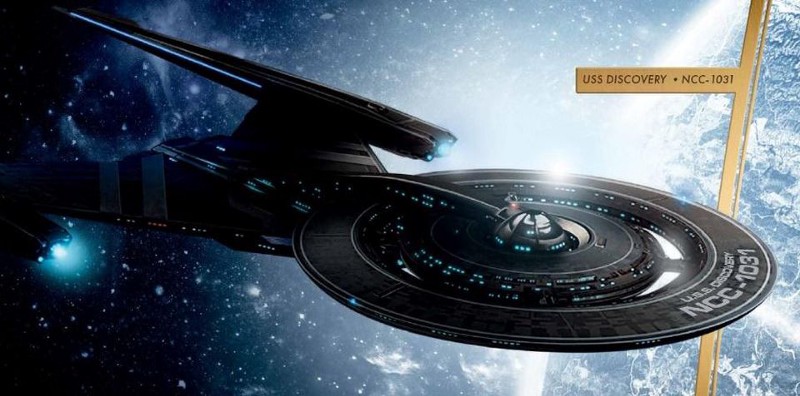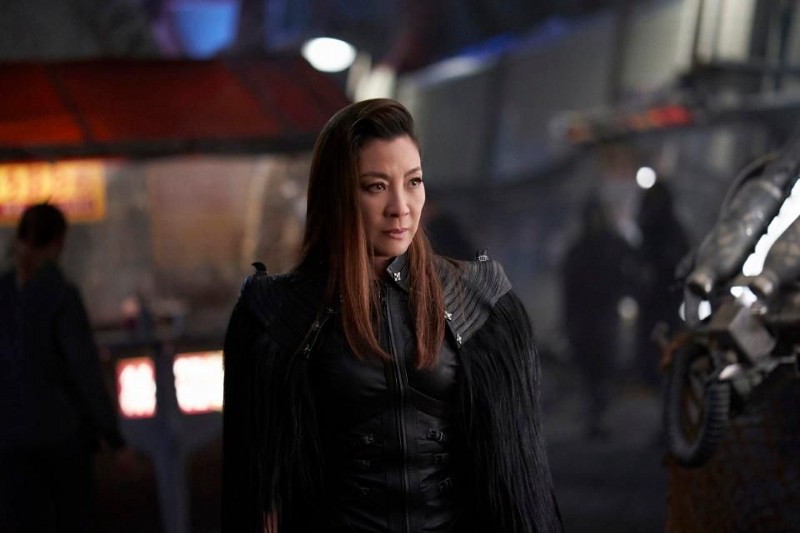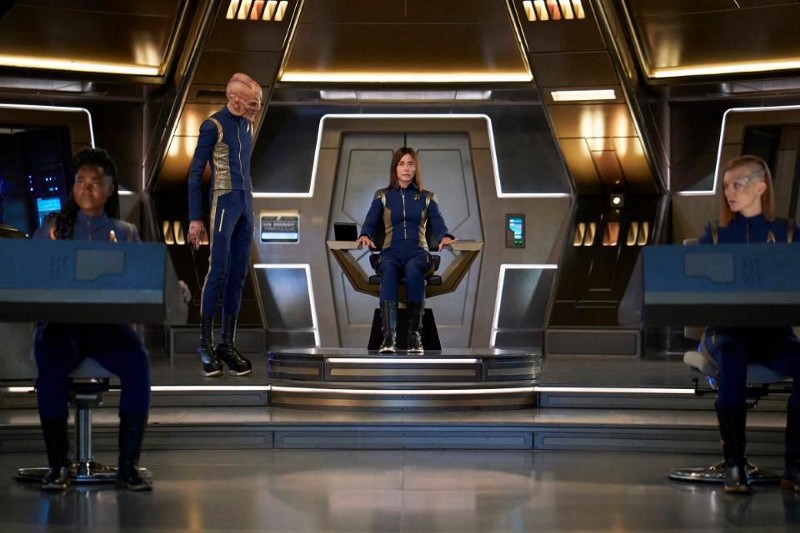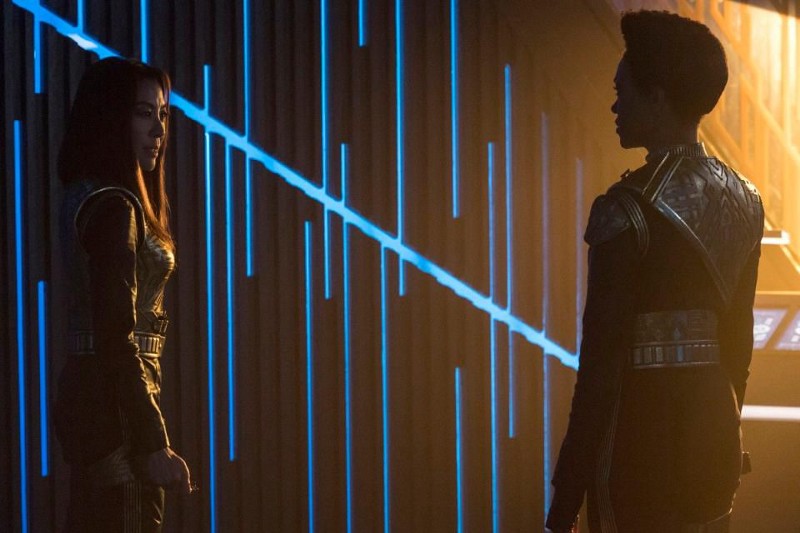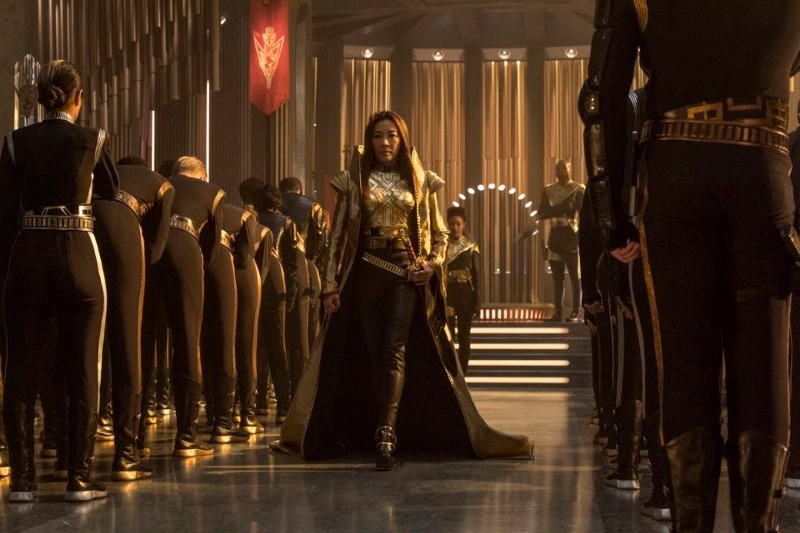‘Star Trek: Discovery’ Goes Psychic & Psychedelic in ‘Lethe’: Season 1, Episode 6 Review

There’s no science in this episode of science fiction… but there’s a lot of suspicious happenings that no one’s noticing.
Following up on the best episode of the season, thus far, is often a tall order. Despite distancing itself from the plot points of the previous episodes, Star Trek: Discoveryfalls into its worst trappings: non-existent science, characters behaving the opposite way of how we’re told they behave, black-and-white ethical situations, and very little depth to the story or the characters. It’s very much as though someone wrote an interesting plot outline, then it was turned into a joke of a space nightmare by a combination of poor writers and directors, and some very good actors (Martin-Green as Burnham, Isaacs as Lorca, and Brook as Cornwell) aren’t enough to salvage the episode. While the ongoing nature of the show means there’s always hope that the next episode will be better, this was a big letdown after last week’s big improvement.
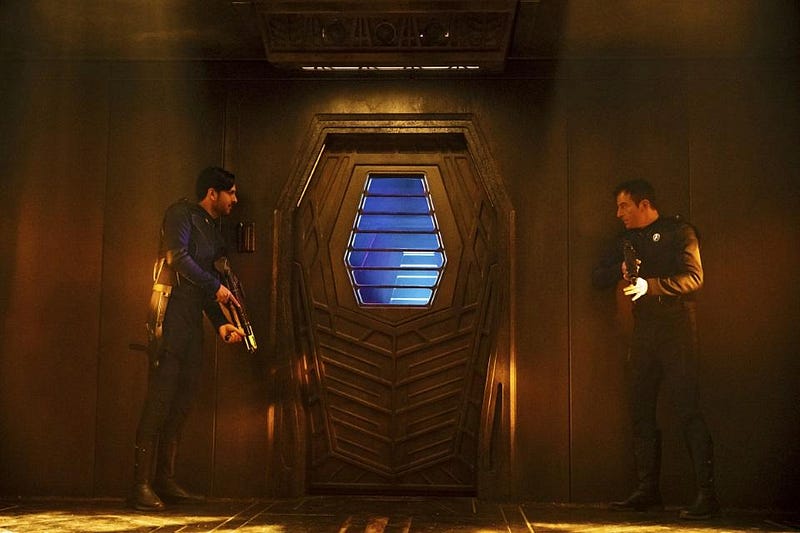
Recap: The show opens with Sarek and another Vulcan aboard a ship, heading for a peace negotiation between the Federation and the Klingons. Burnham and Lilly train by running through the ship, while Lorca and Tyler bond by simulating combat with Klingon aggressors, showing how strongly they’ve bonded to one another when Lorca offers Tyler the Chief of Security position. Sarek’s companion blows himself up, leaving Sarek stranded and unconscious in a psychedelic green-and-pink nebula.
A handshake with Tyler sends Burnham into Sarek’s mind, as she senses his distress, and discovers a flashback in his mind to the date Burnham was rejected from the Vulcan academy. Burnham tells Lorca, when she recovers, about the Vulcan extremists who want to block the mediation of a Starfleet-Klingon peace. Lorca makes the bold decision, despite the Vulcan’s and Federation’s objections, to go rescue Sarek on his own. Burnham wants to go on a mission to mindmeld with Sarek, and visits Stamets to see about using the spores to enhance the mindmeld with Sarek. It won’t work, so she flies in on a Shuttle instead, with Tyler piloting.
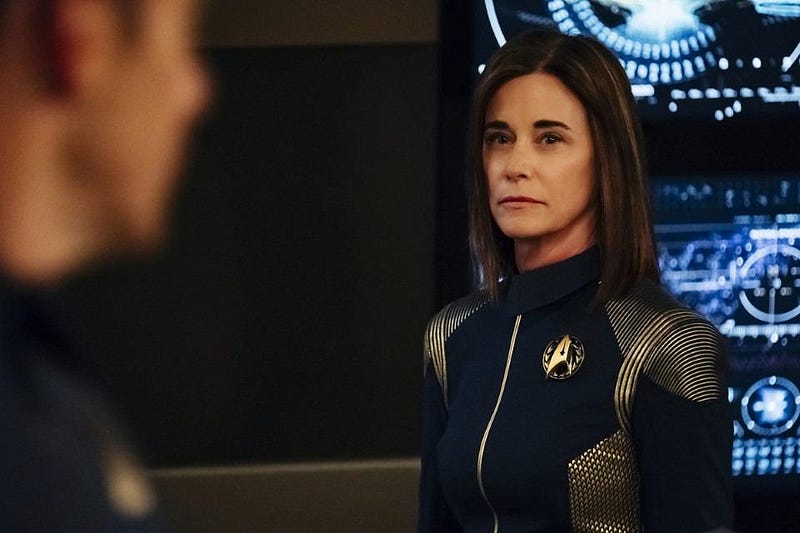
Admiral Cornwell is pissed about Lorca’s decision, and is worried about his post-torture mental state. Meanwhile, as Tilly and Burnham travel deeper into the nebula, we see more and more of the flashback in Sarek’s mind, but he resists showing Burnham the full story. Cornwell, we learn, is a doctor as well as an admiral, concerned for Lorca but also still attracted to him. Along to serve the role of a good pilot to navigate the nebula, Tyler goes to give advice to Burnham aboard the shuttle on how to break through in Sarek’s mind. Finally, Sarek shows Burnham that he was given a Sophie’s choice: only Burnham or Spock can be selected to the Vulcan academy. Sarek chose his biological son, Spock, over Burnham. All for naught, of course, as Spock later chose Starfleet for himself instead.
But this enables Burnham to reach Sarek, and he wakes up, at least enough to send out a distress beacon, so Tyler and company can locate him. Cornwell touches the scars of Lorca in bed together while he sleeps, waking him up and causing him to grab a phaser and leap atop Cornwell, who freaks. Concluding that Lorca has severe PTSD, she threatens to take his command away. He pleads; she wavers. Then Lorca promotes Burnham to a bridge science officer for her successful mind-probing of Sarek. Cornwell lets Lorca remain in command for a while, but says that after these negotiations, she’ll have him committed.
Burnham and Tyler share a moment of pleasant conversation and shake hands without incident. Meanwhile, Cornwell’s diplomatic expedition gets ambushed and murdered, along with the hosts. Cornwell is taken prisoner by the Klingons at the end, with Kol promising cloaking devices for a job well done. Saru gives the news to Lorca, who has them contact Starfleet Command and let them know. At the end, we see Lorca still carries his phaser in his back pocket.
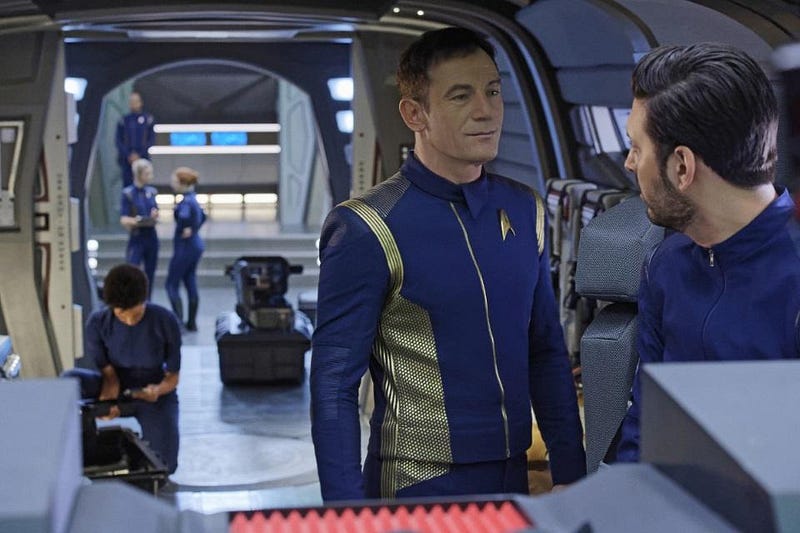
Review: Pretty much every scene has major, major problems with its execution. Sarek forgets to act like a Vulcan in the opening scenes, with no stoic, logical veneer customary to Vulcans (and to Sarek in other episodes and other incarnations of Star Trek). Lilly is out of breath and having a hard time running, until Burnham motivates her to become a Captain, and then all of a sudden she can run as fast as she wants. Also, both Burnham and Lilly wear “DISCO” shirts for training. Is this a plug for Discovery within the show? I prefer to think that they just train everyone, in the 23rd century, by having them listen to music that emphasizes every beat. And Lorca promotes Tyler to Chief of Security despite… knowing him for a week? Is Tyler a plant, a traitor, a Klingon spy, or something worse? No matter; our last Chief of Security was an unskilled dumbass with a death wish, so why not just make the unvetted new guy the new Security Chief?
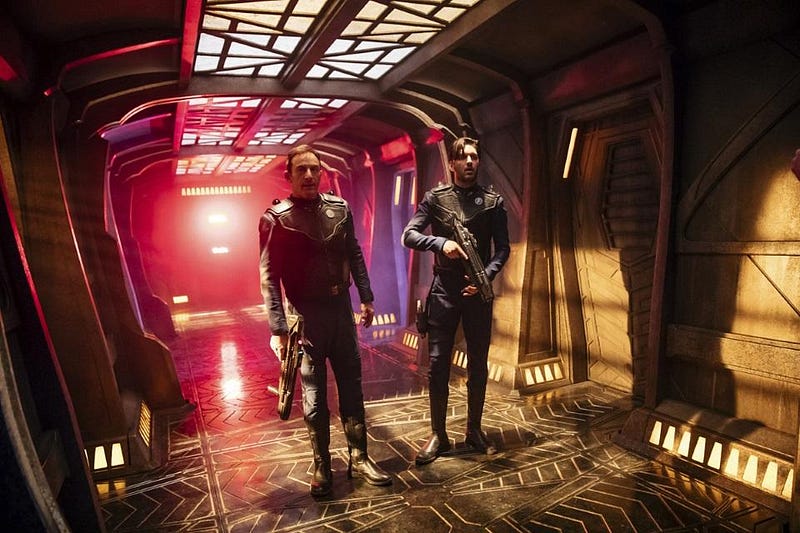
Then, despite the fact that Sarek tells Burnham that her rejection from the Vulcan academy is about racism — the powers-that-be didn’t want her human emitions getting in the way — Burnham concludes that she’s the failure as a result. The laziest problem of Star Trek: Discovery rears its head again, as they talk about Burnham being so logical while simultaneously showing how emotionally and illogically she actually behaves. Stamets, when we see him, seems to be there only for comic relief, behaving way out-of-character, perhaps as a result of his mycelium experience. So Lorca orders a shuttle, piloted by Tyler, into the nebula, to locate Sarek.
Tilly, more and more, proves herself to be nothing more than the audience surrogate. The most interesting thing about her is that she has a bump on her forehead… while Burnham has a divot in hers. I wonder if that’s the most intimate bond that two roommates can share in Federation space? Meanwhile, Ash Tyler, who doesn’t know her at all, comes over to Burnham aboard the shuttle to give advice on how to connect with Sarek. Whom he doesn’t know. While he should be piloting the shuttle. Which no one is doing. While they fly through a nebula filled with “radioactive” material. Which we’re told is dangerous, and yet he doesn’t even stop the ship to have this conversation.
Then Burnham learns the truth about Sarek’s choice. Somehow, she doubles down on “you let me believe I was a failure,” even though no such thing occurred. For all the hundreds of thousands of college kids rejected from their first choice school every year — like most of us were, and like I was, way back in the day — we learn that it wasn’t because we were failures, but rather because the criteria the school was looking for didn’t match up with what we were. Burnham, apparently, has never learned to deal with this type of rejection, or to view it as anything other than her failure. Even after seven years in Starfleet, seeing how this unfolds all around her, she hasn’t learned.
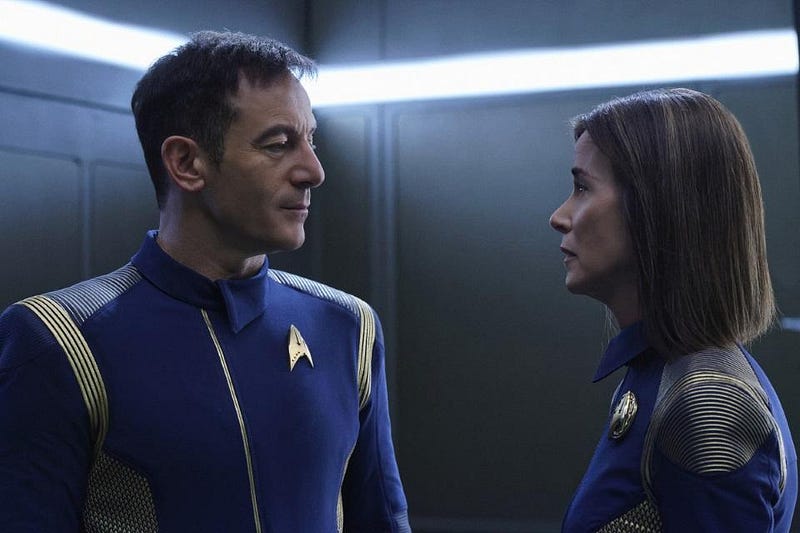
Cornwell… well, too bad she’s not into phaser fear play, for Lorca’s sake. Lorca is clearly troubled, and sleeps with a phaser under his pillow. This is actually a solid depiction of one way that trauma, fear, and PTSD can play out; kudos on that. Is Lorca fit for command? It’s a question that goes unanswered, as perhaps it should. How could anyone be certain? Cornwell struggles over it, and this is done well. Those of us who’ve known people who’ve come back from war or trauma agonize over the best way forward.
Sarek and Burnham converse in sickbay. Sarek decides to be a jackass for no reason, and that’s really the full story here. “Hey, thanks for saving me, sorry-not-sorry for all the trauma I caused you, go be sad and depressed like me now.” Now’s the time you pick to start being cold and emotionless, Sarek? Give me a break. After this, Burnham tells Tilly that she gave her bad advice for becoming a Captain, and that she can take her own path. It’s a very nice gesture, but until we see Tilly demonstrate some competence at something, I’m very, very hesitant for anyone to be giving her advice on rising through the ranks. She continues to be an awkward but somewhat-charming personality, with no real skills or talents, but who’s Burnham’s roommate, so she gets a prominent role in the show.
Finally, Lorca demonstrates some level-headedness in contacting Starfleet Command about Cornwell’s capture. The “diplomatic meeting” was a murderfest that you could see coming a mile away, yet no one in the show actually saw it coming. Now Cornwell’s a P.O.W., and the Klingons have a captured Admiral. Oh, and Klingon cloaking devices are everywhere now, as Kol rises higher and higher in his seat of power. At least in Kol, we have an interesting villain rising to power.
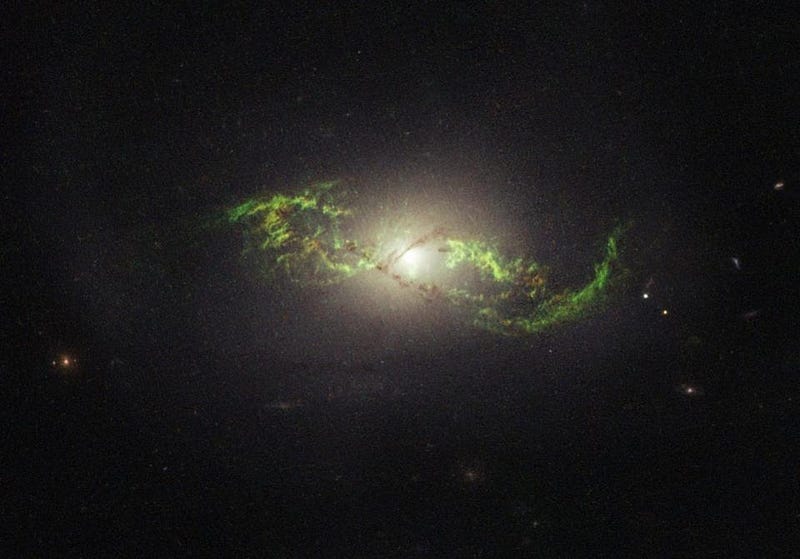
The Science: Let’s not pretend this nebula that they show is in any way realistic. It’s not even visually attractive; it’s designed to be pink and green lightning clouds. They claim it’s filled with “radioactive” material, even though it’s the high-energy, ionizing radiation that causes greens (with doubly ionized oxygen at ~50,000 K) and pinks (with ionized hydrogen at somewhat lower temperatures). But in real life, these regions are large and diffuse, and only show up because they’re powered by external or internal radiation, like newly formed stars. All of this would be perhaps excusable if it were visually attractive, but it’s not. It looks like someone went fingerpainting with a visual effect and two different-colored fingers.
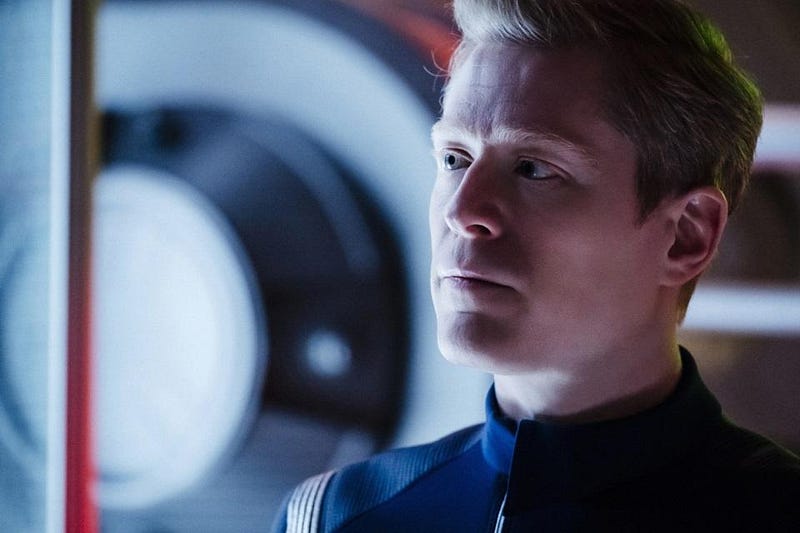
Stamets… Stamets is obviously tripping. His pupils are dilated super big when he appears on screen, his speech patterns and word usage is off, and the normally focused scientist uses explosion sounds instead of words to communicate. He’s clearly hallucinating after inhaling the mycelium spores when he used his own body to power the spore drive, and not only does nobody notice, but nobody has thought to test him out to make sure he’s okay. And his partner (husband?) is the doctor!
Lorca at least is a believable depiction of PTSD. The Lorca-Cornwell scenes remind me very much of my friends and acquaintances who’ve come back from war, rape, shootings, or other traumatic experiences and don’t feel like their old selves anymore. There are pathways in his brain that appear to thrive on reacting rather than thinking, and that part is done quite well. It’s one of the most refreshingly good scenes in the show, and Brook and Isaacs do a good job bringing the struggles that Cornwell and Lorca have with it to life.
Oh, and I guess they have holodecks on Discovery, even though we wouldn’t see them again until over 100 years later aboard the Enterprise-D. That’s alright; technologies are advancing faster than the Star Trektimelines had predicted, so it’s hard to be mad about making those adjustments. (I know; I wrote the book on it!)
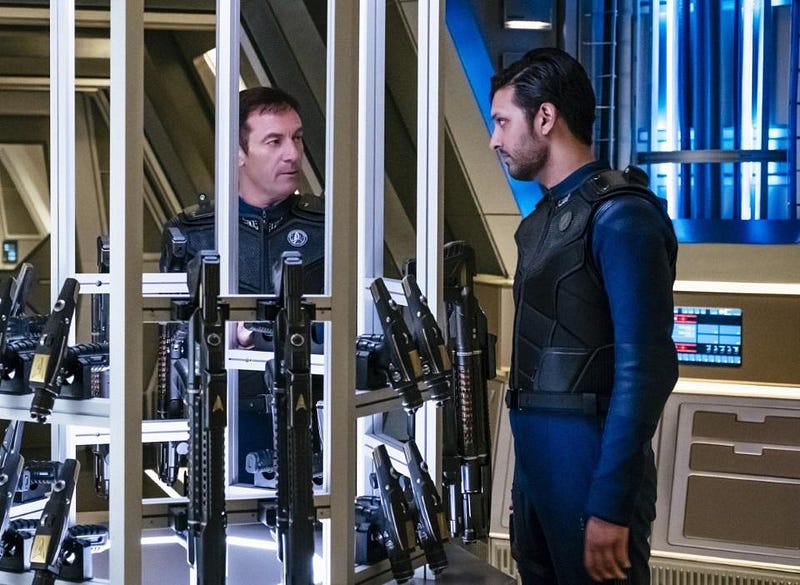
Right and wrong: Should a compromised Lorca be in command of Discovery? That’s really the only ethical question that doesn’t have an easy answer in the show. And the show decides, “no, he shouldn’t, but we’re going to let him by allowing the Admiral who’d have him removed get captured by the Klingons.” Everything else that’s a dilemma in the episode:
- How far should we trust Ash Tyler?
- How stable and reliable is Burnham?
- Is Sarek an ethical character or a cowardly one who can’t admit his own failings?
isn’t even addressed. The only other ethical question that Star Trek: Discovery weighs in on is the question of “is racial purity good?” There are factions of Vulcans and Klingons who believe that it is, and they’re shown to be dishonorable, murderous terrorists. This would be a better fit for an episode of Homeland or 24 than for an episode of Star Trek.
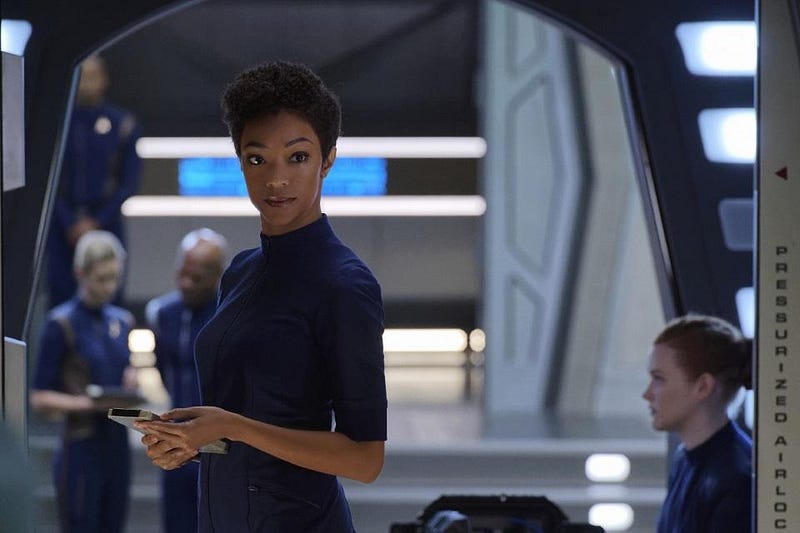
Conclusion: I remember how uneven the first two seasons of Star Trek: The Next Generation were, and that became my favorite Star Trek series of all-time. But so far, six episodes in, we’ve had five misses for me, and just one good episode. Other than Lorca and Cornwell, and perhaps Saru (who isn’t given much to do in this episode), I don’t really care about any of these characters, their motivations, or believe that they’re even good people trying to do the right thing. They’re all wrapped up in their own little worlds, and they just happen to be on a Black Ops ship during a time of war in space.
It’s like watching a Star Trek full of Han Solos. The fifth episode, Choose Your Pain, proved that this new incarnation of Star Trek could work and be effective. This latest episode has shown that unless the show is firing on all cylinders, this type of non-descript, forgettable mediocrity is what we’re in for.
Ethan Siegel is the author of Beyond the Galaxy and Treknology. You can pre-order his third book, currently in development: the Encyclopaedia Cosmologica.
